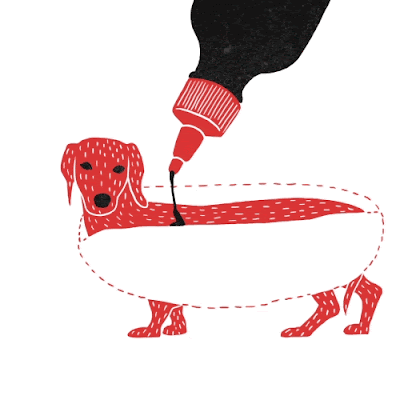New From NPR 上海南京路熱鬧仲夏夜
下載本篇報導聲音檔請點我
Festive Nanjing Road Recaptures Shanghai's Heyday
熱鬧的南京路 重現上海風華
Finally,
this hour, the latest entry in our series, Summer Nights. We've been exploring 探索places that come alive
when the sun goes down and, today, we head to China's financial capital金融首都, Shanghai. In the 1920s
and '30s, Shanghai was one of the world's most exciting and notorious惡名昭彰的 cities. All that ended when the communists
took over被共產黨接手.
But,
in the last decade or so, Shanghai has reemerged再現. It's now a dynamic充滿活力的 city of 23 million with a skyline that
dwarfs that of Manhattan上海大樓天際線之高,讓紐約的曼哈頓都相形失色. NPR's Frank Langfitt reports from China's Times
Square, Nanjing Road中國的時代廣場 – 南京路.
FRANK
LANGFITT, BYLINE: It's Sunday night on Nanjing Road and this is the most vibrant充滿生氣的/欣欣向榮的 part of the city in the
summers. Right now, I'm surrounded by thousands and thousands of people strolling along漫步.
Nanjing Road's
kind of an assault to the senses是一種感官震撼. It's full of old colonial architecture老派的殖民風格建築, tons of neon signs不計其數的霓虹燈 and,
if you can listen here, people come out and sing in the evenings.
LANGFITT:
Right here, there are about two, three hundred people gathered in a circle圍成一圈 to listen to a band.
LANGFITT:
The instruments include drums, flute and the erhu二胡, a two-stringed Chinese fiddle.
Wang Hongping sings with the band every weekend (unintelligible) musicians
playing in public parks公園.
WANG
HONGPING: (Through translator) We're all musical illiterates不會看五線譜, but we really like music. We
common people get together and sing Red songs共產黨的紅歌,
Communist Party共產黨 songs, just to enjoy
ourselves.
LANGFITT:
Wang sings me one of her favorites.
HONGPING:
(Singing in foreign language).
LANGFITT:
The tune旋律 is called "On Top of Beijing's
Golden Mountain北京的金山上." This verse refers
to Chairman Mao毛主席 as a golden sun, warm
and kind. In fact, Mao Zedong hated this sort of Shanghai scene - riotous neon
advertisement喧鬧的霓虹燈廣告, scores of stores大量的商店, a boisterous monument吵雜的建築物象徵to capitalism,
so he put the
city into a
deep sleep讓這個城市陷入沉睡.
In
the
mid-1990s, as Shanghai was waking up, Wang Hongping moved here from the
countryside. Now 45, she works as a barber理髮師 and sells clothes. Wang
says Shanghai's provided great opportunities, including mentoring from her
fellow music makers, something she never could have found back home.
HONGPING:
(Through translator) The Communist Party reformed and allowed us peasants農人 to move to the big cities
and realize our
dreams實踐夢想.
In the countryside, you could never find so many teachers who could teach you
to sing.
LANGFITT:
If music isn't your thing, there's always country line dancing一種一字排開的鄉村舞蹈. In fact, that's kind of what it
looks like. I've just walked up on a group of mostly women and a couple
of men and it looks like they are literally country line dancing.
LANGFITT:
Two women, Zhu Fengying, a retired crane operator起重機駕駛(操作員),
and her dance partner, Gung (unintelligible), explain.
ZHU
FENGYING: (Foreign language spoken).
LANGFITT:
It's the 16-step
dance十六步舞.
It's Chinese, they say.
LANGFITT:
As much fun as Nanjing Road is, there is a little bit of a dark side黑暗面 to the place. I've
sometimes been here on my own and been hit up repeatedly by hookers不斷地被妓女騷擾. Fortunately,
tonight, I'm just walking along talking into a microphone, so all I'm getting
is a lot of stares瞪 and nobody's bothering
me.
LANGFITT:
Crossing the street, avoiding a trolley, I come across this.
LANGFITT:
It's a brass band of elderly men. They're wearing bright red
uniforms with epaulets勳章. Wang Geyuan, 73, plays the
saxophone.
WANG
GEYUAN: (Foreign language spoken).
LANGFITT:
We're the Loving Happiness Band, he says.
LANGFITT:
The band is
private, but receives some government support, hence the five-star
government
emblem徽章
on their caps. Like other performers on Nanjing Road, they play for large
crowds of Chinese tourists, but take no money.
GEYUAN:
(Through translator) The best thing about playing is it makes us happy and, if
we're happy, the audience is happy.
LANGFITT:
Wang, a retired artist with China's People's Liberation Army中國人民解放軍, opens his case and
shows me his saxophone.
GEYUAN:
(Through translator) This saxophone was made by an American company.
It's not a very professional one. This is just a hobby.
LANGFITT:
It says it was made in the United States in 1936.
LANGFITT:
It's now almost 10:00 on Nanjing Road. Security guards appear, signaling it's quitting
time示意要大家散會了. As the summer crowds thin out當人潮逐漸散去, the band plays one
final song.
LANGFITT:
Frank Langfitt, NPR News, Shanghai.
Copyright © 2012 National
Public Radio. All rights reserved. No quotes from the materials contained
herein may be used in any media without attribution to National Public Radio.
This transcript is provided for personal, noncommercial use only, pursuant to
our Terms of Use. Any other use requires NPR's prior permission. Visit our
permissions page for further information.
NPR transcripts are created on
a rush deadline by a contractor for NPR, and accuracy and availability may
vary. This text may not be in its final form and may be updated or revised in
the future. Please be aware that the authoritative record of NPR's programming
is the audio.











留言
張貼留言